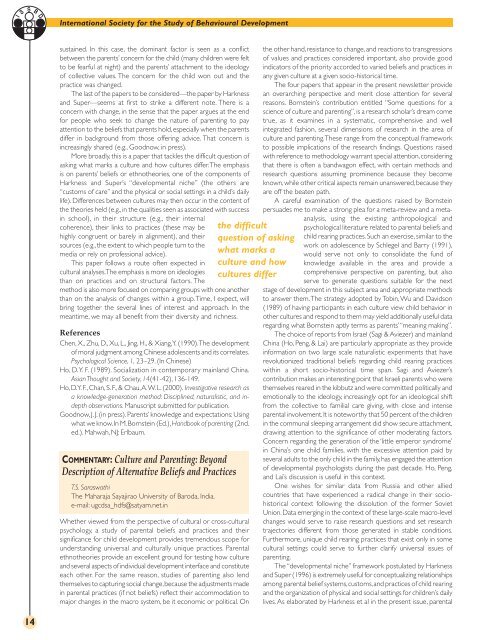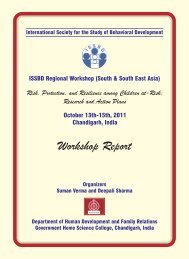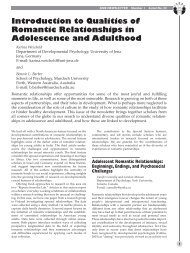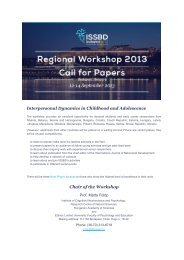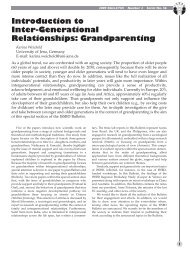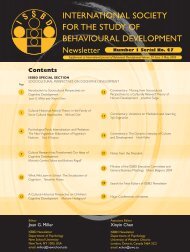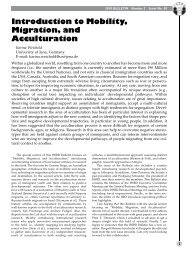Culture and Parenting - International Society for the Study of ...
Culture and Parenting - International Society for the Study of ...
Culture and Parenting - International Society for the Study of ...
You also want an ePaper? Increase the reach of your titles
YUMPU automatically turns print PDFs into web optimized ePapers that Google loves.
S<br />
I<br />
S<br />
B<br />
D<br />
<strong>International</strong> <strong>Society</strong> <strong>for</strong> <strong>the</strong> <strong>Study</strong> <strong>of</strong> Behavioural Development<br />
sustained. In this case, <strong>the</strong> dominant factor is seen as a conflict<br />
between <strong>the</strong> parents’ concern <strong>for</strong> <strong>the</strong> child (many children were felt<br />
to be fearful at night) <strong>and</strong> <strong>the</strong> parents’ attachment to <strong>the</strong> ideology<br />
<strong>of</strong> collective values. The concern <strong>for</strong> <strong>the</strong> child won out <strong>and</strong> <strong>the</strong><br />
practice was changed.<br />
The last <strong>of</strong> <strong>the</strong> papers to be considered—<strong>the</strong> paper by Harkness<br />
<strong>and</strong> Super—seems at first to strike a different note. There is a<br />
concern with change, in <strong>the</strong> sense that <strong>the</strong> paper argues at <strong>the</strong> end<br />
<strong>for</strong> people who seek to change <strong>the</strong> nature <strong>of</strong> parenting to pay<br />
attention to <strong>the</strong> beliefs that parents hold,especially when <strong>the</strong> parents<br />
differ in background from those <strong>of</strong>fering advice. That concern is<br />
increasingly shared (e.g., Goodnow, in press).<br />
More broadly, this is a paper that tackles <strong>the</strong> difficult question <strong>of</strong><br />
asking what marks a culture <strong>and</strong> how cultures differ.The emphasis<br />
is on parents’ beliefs or ethno<strong>the</strong>ories, one <strong>of</strong> <strong>the</strong> components <strong>of</strong><br />
Harkness <strong>and</strong> Super’s “developmental niche” (<strong>the</strong> o<strong>the</strong>rs are<br />
“customs <strong>of</strong> care” <strong>and</strong> <strong>the</strong> physical or social settings in a child’s daily<br />
life). Differences between cultures may <strong>the</strong>n occur in <strong>the</strong> content <strong>of</strong><br />
<strong>the</strong> <strong>the</strong>ories held (e.g.,in <strong>the</strong> qualities seen as associated with success<br />
in school), in <strong>the</strong>ir structure (e.g., <strong>the</strong>ir internal<br />
coherence), <strong>the</strong>ir links to practices (<strong>the</strong>se may be<br />
highly congruent or barely in alignment), <strong>and</strong> <strong>the</strong>ir<br />
sources (e.g.,<strong>the</strong> extent to which people turn to <strong>the</strong><br />
media or rely on pr<strong>of</strong>essional advice).<br />
This paper follows a route <strong>of</strong>ten expected in<br />
cultural analyses.The emphasis is more on ideologies<br />
than on practices <strong>and</strong> on structural factors. The<br />
method is also more focused on comparing groups with one ano<strong>the</strong>r<br />
than on <strong>the</strong> analysis <strong>of</strong> changes within a group.Time, I expect, will<br />
bring toge<strong>the</strong>r <strong>the</strong> several lines <strong>of</strong> interest <strong>and</strong> approach. In <strong>the</strong><br />
meantime, we may all benefit from <strong>the</strong>ir diversity <strong>and</strong> richness.<br />
References<br />
Chen, X., Zhu, D., Xu, L., Jing, H., & Xiang,Y. (1990).The development<br />
<strong>of</strong> moral judgment among Chinese adolescents <strong>and</strong> its correlates.<br />
Psychological Science, 1, 23–29. (In Chinese)<br />
Ho, D.Y. F. (1989). Socialization in contemporary mainl<strong>and</strong> China.<br />
Asian Thought <strong>and</strong> <strong>Society</strong>, 14(41-42), 136-149.<br />
Ho, D.Y. F., Chan, S. F., & Chau,A.W. L. (2000). Investigative research as<br />
a knowledge-generation method: Disciplined, naturalistic, <strong>and</strong> indepth<br />
observations. Manuscript submitted <strong>for</strong> publication.<br />
Goodnow, J. J. (in press). Parents’ knowledge <strong>and</strong> expectations: Using<br />
what we know.In M.Bornstein (Ed.),H<strong>and</strong>book <strong>of</strong> parenting (2nd.<br />
ed.). Mahwah, NJ: Erlbaum.<br />
COMMENTARY: <strong>Culture</strong> <strong>and</strong> <strong>Parenting</strong>: Beyond<br />
Description <strong>of</strong> Alternative Beliefs <strong>and</strong> Practices<br />
T.S. Saraswathi<br />
The Maharaja Sayajirao University <strong>of</strong> Baroda, India.<br />
e-mail: ugcdsa_hdfs@satyam.net.in<br />
Whe<strong>the</strong>r viewed from <strong>the</strong> perspective <strong>of</strong> cultural or cross-cultural<br />
psychology, a study <strong>of</strong> parental beliefs <strong>and</strong> practices <strong>and</strong> <strong>the</strong>ir<br />
significance <strong>for</strong> child development provides tremendous scope <strong>for</strong><br />
underst<strong>and</strong>ing universal <strong>and</strong> culturally unique practices. Parental<br />
ethno<strong>the</strong>ories provide an excellent ground <strong>for</strong> testing how culture<br />
<strong>and</strong> several aspects <strong>of</strong> individual development interface <strong>and</strong> constitute<br />
each o<strong>the</strong>r. For <strong>the</strong> same reason, studies <strong>of</strong> parenting also lend<br />
<strong>the</strong>mselves to capturing social change,because <strong>the</strong> adjustments made<br />
in parental practices (if not beliefs) reflect <strong>the</strong>ir accommodation to<br />
major changes in <strong>the</strong> macro system, be it economic or political. On<br />
<strong>the</strong> difficult<br />
question <strong>of</strong> asking<br />
what marks a<br />
culture <strong>and</strong> how<br />
cultures differ<br />
<strong>the</strong> o<strong>the</strong>r h<strong>and</strong>,resistance to change,<strong>and</strong> reactions to transgressions<br />
<strong>of</strong> values <strong>and</strong> practices considered important, also provide good<br />
indicators <strong>of</strong> <strong>the</strong> priority accorded to varied beliefs <strong>and</strong> practices in<br />
any given culture at a given socio-historical time.<br />
The four papers that appear in <strong>the</strong> present newsletter provide<br />
an overarching perspective <strong>and</strong> merit close attention <strong>for</strong> several<br />
reasons. Bornstein’s contribution entitled “Some questions <strong>for</strong> a<br />
science <strong>of</strong> culture <strong>and</strong> parenting”,is a research scholar’s dream come<br />
true, as it examines in a systematic, comprehensive <strong>and</strong> well<br />
integrated fashion, several dimensions <strong>of</strong> research in <strong>the</strong> area <strong>of</strong><br />
culture <strong>and</strong> parenting.These range from <strong>the</strong> conceptual framework<br />
to possible implications <strong>of</strong> <strong>the</strong> research findings. Questions raised<br />
with reference to methodology warrant special attention,considering<br />
that <strong>the</strong>re is <strong>of</strong>ten a b<strong>and</strong>wagon effect, with certain methods <strong>and</strong><br />
research questions assuming prominence because <strong>the</strong>y become<br />
known,while o<strong>the</strong>r critical aspects remain unanswered,because <strong>the</strong>y<br />
are <strong>of</strong>f <strong>the</strong> beaten path.<br />
A careful examination <strong>of</strong> <strong>the</strong> questions raised by Bornstein<br />
persuades me to make a strong plea <strong>for</strong> a meta-review <strong>and</strong> a metaanalysis,<br />
using <strong>the</strong> existing anthropological <strong>and</strong><br />
psychological literature related to parental beliefs <strong>and</strong><br />
child rearing practices. Such an exercise, similar to <strong>the</strong><br />
work on adolescence by Schlegel <strong>and</strong> Barry (1991),<br />
would serve not only to consolidate <strong>the</strong> fund <strong>of</strong><br />
knowledge available in <strong>the</strong> area <strong>and</strong> provide a<br />
comprehensive perspective on parenting, but also<br />
serve to generate questions suitable <strong>for</strong> <strong>the</strong> next<br />
stage <strong>of</strong> development in this subject area <strong>and</strong> appropriate methods<br />
to answer <strong>the</strong>m.The strategy adopted by Tobin,Wu <strong>and</strong> Davidson<br />
(1989) <strong>of</strong> having participants in each culture view child behavior in<br />
o<strong>the</strong>r cultures <strong>and</strong> respond to <strong>the</strong>m may yield additionally useful data<br />
regarding what Bornstein aptly terms as parents’“meaning making”.<br />
The choice <strong>of</strong> reports from Israel (Sagi & Aviezer) <strong>and</strong> mainl<strong>and</strong><br />
China (Ho, Peng, & Lai) are particularly appropriate as <strong>the</strong>y provide<br />
in<strong>for</strong>mation on two large scale naturalistic experiments that have<br />
revolutionized traditional beliefs regarding child rearing practices<br />
within a short socio-historical time span. Sagi <strong>and</strong> Aviezer’s<br />
contribution makes an interesting point that Israeli parents who were<br />
<strong>the</strong>mselves reared in <strong>the</strong> kibbutz <strong>and</strong> were committed politically <strong>and</strong><br />
emotionally to <strong>the</strong> ideology, increasingly opt <strong>for</strong> an ideological shift<br />
from <strong>the</strong> collective to familial care giving, with close <strong>and</strong> intense<br />
parental involvement.It is noteworthy that 50 percent <strong>of</strong> <strong>the</strong> children<br />
in <strong>the</strong> communal sleeping arrangement did show secure attachment,<br />
drawing attention to <strong>the</strong> significance <strong>of</strong> o<strong>the</strong>r moderating factors.<br />
Concern regarding <strong>the</strong> generation <strong>of</strong> <strong>the</strong> ‘little emperor syndrome’<br />
in China’s one child families, with <strong>the</strong> excessive attention paid by<br />
several adults to <strong>the</strong> only child in <strong>the</strong> family,has engaged <strong>the</strong> attention<br />
<strong>of</strong> developmental psychologists during <strong>the</strong> past decade. Ho, Peng,<br />
<strong>and</strong> Lai’s discussion is useful in this context.<br />
One wishes <strong>for</strong> similar data from Russia <strong>and</strong> o<strong>the</strong>r allied<br />
countries that have experienced a radical change in <strong>the</strong>ir sociohistorical<br />
context following <strong>the</strong> dissolution <strong>of</strong> <strong>the</strong> <strong>for</strong>mer Soviet<br />
Union.Data emerging in <strong>the</strong> context <strong>of</strong> <strong>the</strong>se large-scale macro-level<br />
changes would serve to raise research questions <strong>and</strong> set research<br />
trajectories different from those generated in stable conditions.<br />
Fur<strong>the</strong>rmore, unique child rearing practices that exist only in some<br />
cultural settings could serve to fur<strong>the</strong>r clarify universal issues <strong>of</strong><br />
parenting.<br />
The “developmental niche” framework postulated by Harkness<br />
<strong>and</strong> Super (1996) is extremely useful <strong>for</strong> conceptualizing relationships<br />
among parental belief systems,customs,<strong>and</strong> practices <strong>of</strong> child rearing<br />
<strong>and</strong> <strong>the</strong> organization <strong>of</strong> physical <strong>and</strong> social settings <strong>for</strong> children’s daily<br />
lives. As elaborated by Harkness et al in <strong>the</strong> present issue, parental<br />
14


